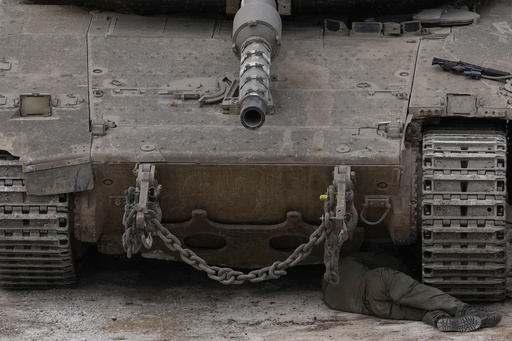DEIR AL-BALAH, Gaza Strip — A relentless barrage of Israeli airstrikes targeted the Gaza Strip overnight, with one significant attack devastating a home sheltering displaced families in the northern part of the region. According to Palestinian health authorities, these strikes resulted in the deaths of at least 33 individuals, which included children.
In a separate incident near Jerusalem, an Israeli bus was shot at by an alleged Palestinian gunman late Wednesday, leaving three people wounded, including a 10-year-old boy. This attack occurred on a highway close to major Israeli settlements within the occupied West Bank, prompting the military to launch a search for the assailant in the Bethlehem area.
Despite a recent ceasefire established with Hezbollah militants in Lebanon, the ongoing conflict between Israel and Hamas in Gaza shows no signs of resolution. Both current and incoming U.S. administrations express a desire to conclude the Gaza conflict before the upcoming January inauguration, yet attempts at negotiating a ceasefire have stalled repeatedly.
On this day, the U.N. General Assembly passed resolutions largely calling for an immediate ceasefire in Gaza and support for the U.N. agency that aids Palestinian refugees, which Israel has attempted to ban. Although these resolutions are not legally binding, they signify a significant global viewpoint, with 158 out of 193 member nations voting in favor. Israel and its ally, the United States, remained in a small minority opposing the measures.
Israeli airstrikes have tragically claimed the lives of three generations in one family. A single strike in Beit Lahiya, near the Gaza-Israel border, caused the deaths of 19 people, as reported by the Kamal Adwan Hospital located nearby. Among the deceased were a family of eight, including four children, their parents, and two grandparents. The Israeli military asserted that their strike targeted a Hamas militant near the hospital, disputing casualty figures without offering further details. They maintain that they strive to limit civilian harm and hold militants accountable for endangering lives by operating within civilian populations.
The hospital reported that another strike near its entrance claimed the lives of a mother and her two children. Dr. Hussam Abu Safiya, the hospital director, revealed that consecutive drone strikes caused panic among over 120 patients in the facility, making it impossible for staff to respond to distress calls from neighbors due to ongoing threats. “We are witnessing a massive loss of life, with many martyrs in the targeted areas,” he stated.
Additionally, airstrikes in the Nuseirat refugee camp resulted in the deaths of at least seven individuals, including two children and their parents. A subsequent attack in the same area killed four more people and injured 16 others. The Israeli military has yet to respond to inquiries regarding these specific strikes.
In Lebanon, Israeli attacks have persisted despite a ceasefire, with reports indicating at least five fatalities from strikes in southern regions. Meanwhile, Israeli forces have returned control of a strategically significant town to the Lebanese army in coordination with U.N. peacekeepers, marking what seems to be the first pullback from a Lebanese territory gained during a recent ground offensive.
The Israeli military also claimed significant successes in Syria, estimating the destruction of 70% to 80% of Syrian military assets following numerous airstrikes.
On Wednesday, Hamas militants launched four rockets from central Gaza toward Israel, with two intercepted and the others landing in unpopulated areas without causing injuries. Consequently, the Israeli military ordered the evacuation of a five-block section of the Maghazi refugee camp, stating that the rockets originated from this area, signaling potential forthcoming strikes.
Since the onset of this conflict on October 7, 2023, when Hamas militants breached Israeli territory, approximately 1,200 people, predominantly civilians, lost their lives, with around 250 individuals taken captive. Current estimates suggest that about 100 hostages remain in Gaza, with at least a third feared dead. In retaliation, Israeli military operations have resulted in over 44,000 Palestinian deaths, predominantly among women and children, though the distinction between militants and civilians has not been clarified in official reports. Israel contends it has eliminated over 17,000 militants but has not provided verified evidence. Thousands more Palestinians have gone missing amidst the fighting, some following encounters with Israeli forces.
The humanitarian crisis in Gaza remains dire as the Israeli military has intensified its offensive against Hamas. Areas such as Beit Lahiya, Beit Hanoun, and the Jabaliya refugee camp have been virtually cut off from aid, pushing tens of thousands of people towards Gaza City in search of safety. Estimates suggest that between 65,000 to 75,000 people may still be trapped in these areas with severely limited access to food, water, electricity, and medical care, raising concerns over potential famine conditions.
Sigrid Kaag, the U.N. humanitarian coordinator for Gaza, emphasized the catastrophic circumstances civilians face amid escalating chaos. Lawlessness and rampant looting have severely hindered aid distribution by U.N. agencies and others attempting to deliver vital supplies to countless individuals in need. Kaag called upon Israel to facilitate access for humanitarian convoys and to reopen availability at the Rafah crossing from Egypt, highlighting the urgent need for essential goods.
Despite ongoing mediation by the United States, Egypt, and Qatar aiming to facilitate negotiations between Israel and Hamas, progress has been slow as Hamas insists that hostages will not be released until the conflict ceases and Israeli forces withdraw entirely. Israeli Prime Minister Benjamin Netanyahu has vowed to continue military operations until Hamas is dismantled and all hostages are safely returned, affirming plans for a sustained military presence in certain areas.



